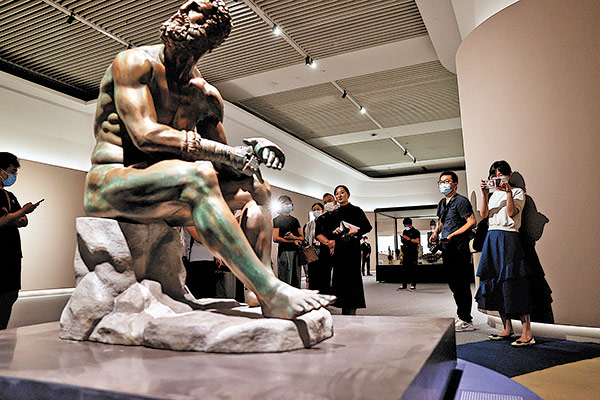

He says the museum will further its contribution to strengthening cultural confidence through intensified academic studies, innovative exhibition plans, creative cultural products and widening international exchanges.
By protecting, inheriting and showing the fruits of the Chinese civilization well, Wang adds, the image of a "credible, lovable and respectable China" will be presented in an even more glamorous, dynamic manner.
Despite the difficulties during the COVID-19 pandemic, the National Museum has still managed to present new exhibitions to celebrate its century-long advancement. It has just opened an exhibition presenting its achievements in major archaeological excavations since 1912 and another of historic coins and bronze ware donated by Luo Bozhao, a prominent numismatist of modern China, as a way to thank the generosity of collectors in helping the museum build its assembly of art and antiques.
The National Museum has joined hands with the Italian Ministry of Culture and the National Roman Museum to present an ongoing exhibition, Tota Italia: Origins of a Nation, in Beijing.
Xi and Italian President Sergio Mattarella respectively sent letters of congratulations on the exhibition opening.
Meanwhile, the National Museum is showing part of its collection reflecting 5,000 years of Chinese food culture at the Liechtenstein National Museum.
The National Museum has also introduced its first AI staff member, a robot named Ai Wenwen, who has just graduated from school and begun her exploration of the museum's treasure trove, and who will usher visitors into a time-traveling journey through the country's long history and immense cultural heritage.
In a global attractions attendance report for 2020, published by the Themed Entertainment Association, an international nonprofit association, and multinational engineering firm AECOM, the National Museum was ranked second.
The museum first made to the annual index, covering the world's top themed parks, water parks and museums, in 2012 when it ranked 14th. The next year it ascended to the third most-visited museum in the world. It has held the second place since 2014, and even topped the index in 2016.
Gu Yucai, deputy director of the National Cultural Heritage Administration who also attended the panel discussion, says, since 2012, the country has seen the number of museums increase to 6,183, which means an addition of a museum every 1.4 days on average. He says museums have improved in quality and service level, and have experienced a more balanced development, and they will become a stronghold to promote the fine traditions of Chinese culture and core socialist values.